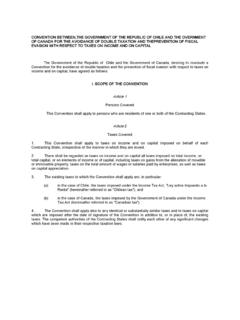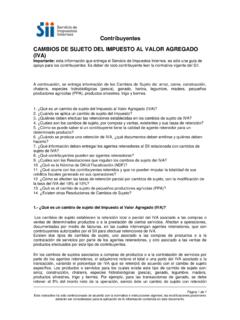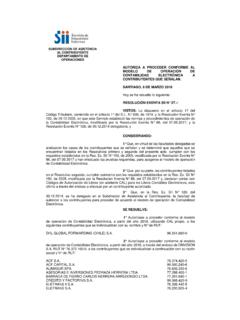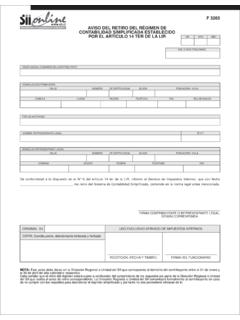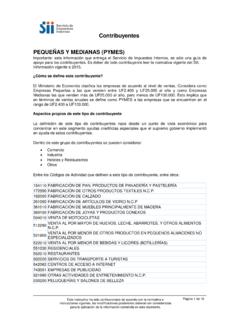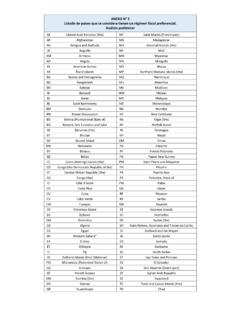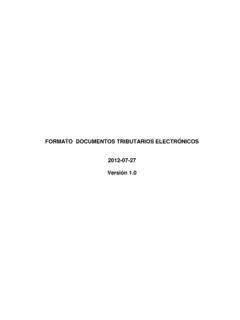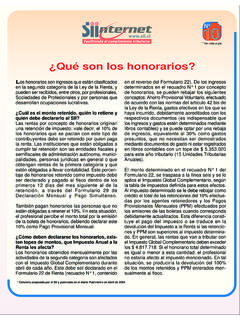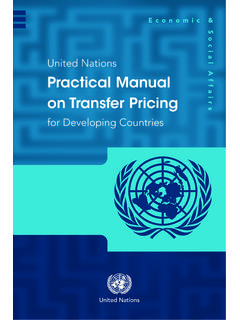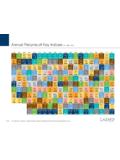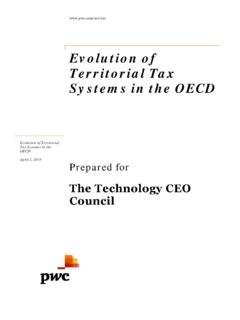Transcription of CONVENTION BETWEEN THE REPUBLIC OF CHILE AND …
1 El documento que se inserta, fue firmado el 10 de Marzo de 2010 en Santiago y fue publicado en el Diario Oficial del 23 de junio de 2013 . El convenio entr en vigor internacional el 8 de febrero de 2013 y se aplica con respecto a los impuestos sobre las rentas que se obtengan y a las cantidades que se paguen, abonen en cuenta, se pongan a disposici n o se contabilicen como gasto, a partir del 1 de enero del a o 2014. CONVENTION BETWEEN THE REPUBLIC OF CHILE AND AUSTRALIA FOR THE AVOIDANCE OF DOUBLE TAXATION WITH RESPECT TO TAXES ON INCOME AND FRINGE BENEFITS AND THE PREVENTION OF FISCAL EVASION The REPUBLIC of CHILE and Australia, desiring to conclude a CONVENTION for the avoidance of double taxation with respect to taxes on income and fringe benefits and the prevention of fiscal evasion; Have agreed as follows: CHAPTER I SCOPE OF THE CONVENTION Article 1 PERSONS COVERED This CONVENTION shall apply to persons who are residents of one or both of the Contracting States.
2 Article 2 TAXES COVERED 1. The existing taxes to which the CONVENTION shall apply are: a) in Australia: (i) the income tax, including the resource rent tax in respect of offshore projects relating to exploration for or exploitation of petroleum resources; and (ii) the fringe benefits tax, imposed under the federal law of Australia (hereinafter referred to as "Australian tax"); and b) in CHILE , the taxes imposed under the Income Tax Act, "Ley sobre Impuesto a la Renta", including the specific tax on mining activity (Impuesto Espec fico a la Actividad Minera), (hereinafter referred to as "Chilean tax"). 2. The CONVENTION shall apply also to any identical or substantially similar taxes that are imposed under the federal law of Australia or the law of CHILE after the date of signature of the CONVENTION in addition to, or in place of, the existing taxes.
3 The competent authorities of the Contracting States shall notify each other of any significant changes that have been made in the law of their respective States relating to the taxes to which the CONVENTION applies within a reasonable period of time after those changes. CHAPTER II DEFINITIONS Article 3 GENERAL DEFINITIONS 1. For the purposes of this CONVENTION , unless the context otherwise requires: a) the term "Australia" means the Commonwealth of Australia and, when used in a geographical sense, excludes all external territories other than: (i) the Territory of Norfolk Island; (ii) the Territory of Christmas Island; (iii) the Territory of Cocos (Keeling) Islands; (iv) the Territory of Ashmore and Cartier Islands; (v) the Territory of Heard Island and McDonald Islands.
4 And (vi) the Coral Sea Islands Territory, and includes any area adjacent to the territorial limits of Australia (including the Territories specified in this subparagraph) in respect of which there is for the time being in force, consistently with international law, a law of Australia dealing with the exploration for or exploitation of any of the natural resources of the exclusive economic zone or the seabed and subsoil of the continental shelf; b) the term " CHILE " means the REPUBLIC of CHILE and, when used in a geographical sense, includes any area outside the territorial sea designated under the laws of the REPUBLIC of CHILE and in accordance with international law as an area within which the REPUBLIC of CHILE may exercise sovereign rights with regard to the seabed and subsoil and their natural resources; c) the terms "a Contracting State" and "the other Contracting State" mean, as the context requires, Australia or CHILE respectively; d) the term "person" includes an individual, a company and any other body of persons; e) the term "company" means any body corporate or any entity that is treated as a company or body corporate for tax purposes.
5 F) the terms "enterprise of a Contracting State" and "enterprise of the other Contracting State" mean respectively an enterprise carried on by a resident of a Contracting State and an enterprise carried on by a resident of the other Contracting State; g) the term "international traffic" means any transport by a ship or aircraft operated by an enterprise of a Contracting State, except when such transport is solely BETWEEN places in the other Contracting State; h) the term "competent authority" means: (i) in Australia, the Commissioner of Taxation or an authorised representative of the Commissioner ; and (ii) in CHILE , the Minister of Finance or an authorised representative of the Minister; i) the term "national" in relation to a Contracting State, means: (i) any individual possessing the nationality or citizenship of that Contracting State; and (ii) any company deriving its status as such from the laws in force in that Contracting State; j) the term "tax" means Australian tax or Chilean tax as the context requires, but does not include any penalty or interest imposed under the law of either Contracting State relating to its tax.
6 2. As regards the application of the CONVENTION at any time by a Contracting State, any term not defined therein shall, unless the context otherwise requires, have the meaning that it has at that time under the law of that State concerning the taxes to which the CONVENTION applies, any meaning under the applicable tax law of that State prevailing over a meaning given to the term under other law of that State. Article 4 RESIDENT 1. For the purposes of this CONVENTION , the term "resident of a Contracting State" means any person who, under the laws of that State, is liable to tax therein as a resident of that State or by reason of domicile in that State, and also includes that State and any political subdivision or local authority thereof.
7 This term, however, does not include any person who is liable to tax in that State in respect only of income from sources in that State. 2. Where by reason of the provisions of paragraph 1 a person, being an individual is a resident of both Contracting States, then the person s status shall be determined as follows: a) the individual shall be deemed to be a resident only of the State in which a permanent home is available to that individual; but if a permanent home is available in both States or in neither of them, that individual shall be deemed to be a resident only of the State with which the individual s personal and economic relations are closer (centre of vital interests); b) if the State in which the centre of vital interests is situated cannot be determined, the individual shall be deemed to be a resident only of the State of which that individual is a national.
8 3. Where by reason of the provisions of paragraph 1 a person other than an individual is a resident of both Contracting States, the person shall not be entitled to any benefits provided by the CONVENTION except that the provisions of Article 24 shall apply. Article 5 PERMANENT ESTABLISHMENT 1. For the purposes of this CONVENTION , the term "permanent establishment" means a fixed place of business through which the business of an enterprise is wholly or partly carried on. 2. The term "permanent establishment" includes especially: a) a place of management; b) a branch; c) an office; d) a factory; e) a workshop; f) a mine, an oil or gas well, a quarry or any other place relating to the exploration for or the exploitation of natural resources; and g) an agricultural, pastoral or forestry property.
9 3. A building site or construction or installation project constitutes a permanent establishment only if it lasts more than six months. 4. Notwithstanding the provisions of paragraphs 1, 2 and 3, where an enterprise of a Contracting State: a) performs services (other than activities to which subparagraphs b) or c) apply) in the other Contracting State, for a period or periods exceeding in the aggregate 183 days in any twelve month period, and these services are performed through one or more individuals who are present and performing such services in that other State; b) carries on activities (including the operation of substantial equipment) in the other State in the exploration for or exploitation of natural resources situated in that other State for a period or periods exceeding in the aggregate 90 days in any twelve month period.
10 Or c) operates substantial equipment in the other State (including as provided in subparagraph b)) for a period or periods exceeding in the aggregate 183 days in any twelve month period, such activities shall be deemed to be performed through a permanent establishment that the enterprise has in that other State, unless the activities are limited to those mentioned in paragraph 6 which, if exercised through a fixed place of business, would not make this fixed place of business a permanent establishment under the provisions of that paragraph. 5. a) The duration of activities under paragraphs 3 and 4 will be determined by aggregating the periods during which activities are carried on in a Contracting State by associated enterprises provided that the activities of the enterprise in that State are substantially the same as the activities carried on in that State by its associate.
